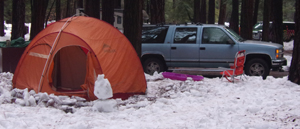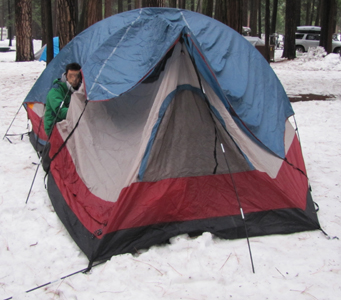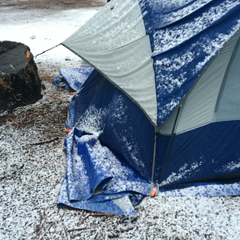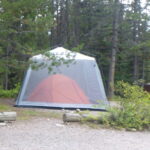The first section of this page has tents that are totally inappropriate for any of our camping trips, winter or summer, established campground or somewhere we go with a wilderness permit.
If you do not know why each is an unacceptable overnight accommodation, please read
Snow or rain camp must-haves
and let us educate you at a pre-trip meeting.

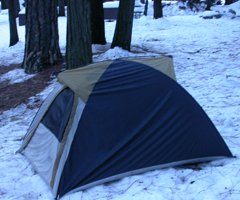
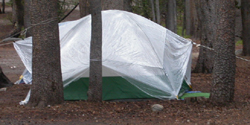
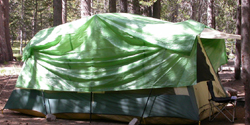
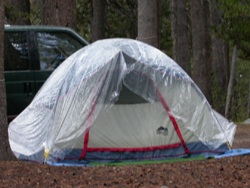
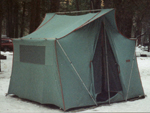
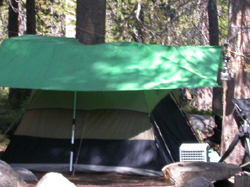
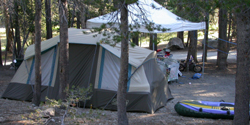
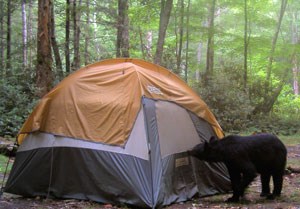
Camping in a Yosemite National Park meadow in 1937:
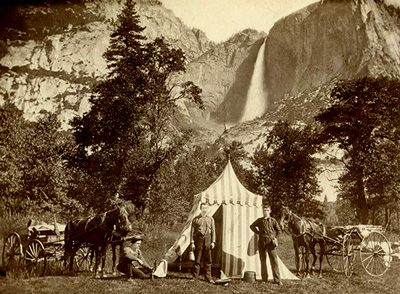
– – – – – – – – – – – – – – – – – – – – – – – – – – – – – – – – – – – – – – – – – –
Here is what it can look like when a bear gets done investigating a tent:
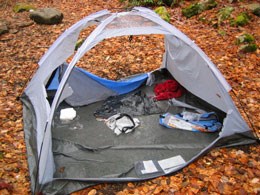
– – – – – – – – – – – – – – – – – – – – – – – – – – – – – – – – – – – – – – – – – –
This next section has good tents, but mistakes using or pitching them:
Pitch your tent by yourself when you arrive after dark and in the morning you might discover you put the rain fly and poles on upside down:
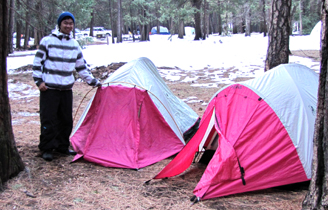
OOOOPs, he discovered when he got to the campsite and pitched the tent, that he
had not dried out his tent completely the last time he used it, so it had mold.
He and friend slept somewhat comfortably in the Chevy Suburban instead:
On the 2017 winter trip these next people pitched their tent incorrectly.
(Many tents have instructions printed on the bag, did they read them? If they borrowed it from someone did they ask for instruction on how to pitch it? Did they try pitching it before the trip?) When they were having difficulty with it they did not ask other more experienced campers they were traveling with for help.
In the dark, from a distance, it looked to the other campers as if they were okay.
They were found trying to sleep in their car in the morning and complained that their tent was “unstable,” as if to say it was a fault of the construction/design of the tent, rather than their failure to properly put the ends of the rain fly tent poles into the ring pins at the base of the tent. As far as the rest of the group could tell, they had just stuck the ends of the rain fly tent poles in the snow.
No good tent should have the ends of the rain fly poles in the ground or in the snow. All good tents will have tabs at the corners with grommets or pockets or ring pins for the ends of poles to go in to, as in the example below from this page: How to pitch the Cabella eight person tent.
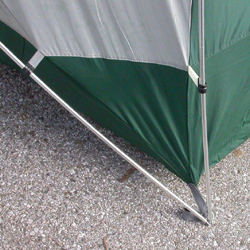
Oooops, left the rainfly at home
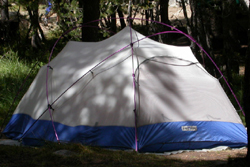
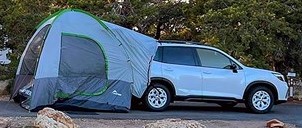
or a “vehicle connector” canopy to stretch out from your tent to your car, won’t fit if you are sharing a campsite with other vehicles (unless you get a campsite that can fit a long motor home) and won’t fit in the winter when the snow is not fully plowed away from the campsite parking spaces.
And here a poorly designed tent with a rain fly that is not pitched taut and does not go all the way down the outside, so rain and melting snow drip down onto the tent fabric and soaks in, plus the classic mistake of having a tarp under the tent that sticks out the sides. Then the rain dripping off the rain fly collects on the tarp and soaks under the tent and through the bottom fabric. (It’s better to custom cut a thick plastic bottom protection that fits completely under the bottom of the tent if you want to protect it from rocks and twigs.) These people said their sleeping bags were wet after only one night.
Would you pitch your 8 foot diameter tent in an 8 foot diameter puddle?
That is, in effect, what these campers did:
And here, a great tent, with a rain fly that goes all the way down the outside, but pitched on a tarp to protect it from rocks. But the tarp sticks out the sides and will create a puddle under the tent when it rains:
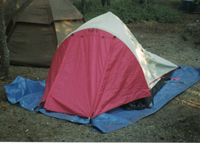
If you look to buy a pre-made tarp specifically fit to go under your tent, you will find it called a “tent footprint.”
![]()
For info on the logistics of where to pitch your tent and staying warm and comfy overnight camping in a tent in the snow, go to: First-timer’s instructions
If you expect lots of mosquitos you could pitch your tent IN a screenroom:
